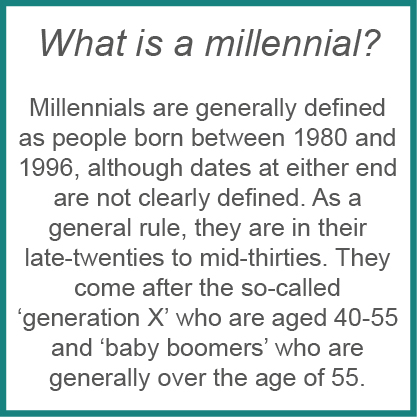Why do millennial staff I employ only stay for a year and then leave?
Do you have trouble keeping your younger employees? Don’t worry, says Lesley Strachan of People Puzzles. It might be that they’re still deciding where they want to be. But understanding what drives millennial staff members might help you retain them for longer.
The issue of millennials in the workplace has caused much discussion in recent years – partly due to research in 2016 by Gallup which found that in the US, six in ten millennials currently in employment were open to looking for new jobs and only three in ten were engaged in the workplace.
Many who work in people management didn’t find this particularly surprising, however. ‘Is it not just that they’re young, experimenting with their career and trying to find their feet?’ Lesley Strachan asks. ‘If the older generation looks at what they were doing in those decades, they might find similar patterns.’
That said, it’s worth considering what factors differentiate millennials from previous generations – and what you can do to help them be happy in your employment.
Find out what Millennial staff value
The easiest way to find this out, Lesley says, is to ask them, either through a staff survey or directly. ‘Ask what would resonate with them most in terms of values, benefits and career development,’ she suggests. ‘There might be all sorts of reasons that person chose to work in your business. It might be a career decision – or it might be more of a temporary thing while they plan to travel or chase their passions elsewhere.’
Provide training and development
If they are focused on building their career, they may well value opportunities to develop their skills and knowledge. ‘They may be children of parents who have been through training, development or personal self-discovery,’ says Lesley. ‘Their schooling may also have made them think about their careers at an early stage.’ Having a clear development plan might be a way of keeping your millennial talent interested in the organisation.
Help them make a difference
Many people want to make a difference in their first job and not simply feel like a cog in a machine. ‘Harness what they know and get it applied, allow them to experiment and question your work practices,’ suggests Lesley. ‘But make sure you challenge them to come up with a solution. That way you’re letting them make a difference, which is a massive thing when you start off in your career.’
Utilise their grasp of technology
Perhaps the biggest difference between millennials and previous generations is their unprecedented access to technology and information. Employers might well benefit from tapping into their millennial employees’ tech-savvy background. ‘They might have a view on how technology could change the way your people work,’ says Lesley. ‘This could help them be part of an evolution within the business that benefits everyone.’
Celebrate their talents
If not technology, might there be another skill your employees possess that you could utilise or at least record in case it becomes useful in future? ‘That is so exciting in the workplace, especially for young people,’ Lesley says. ‘Any secret skill – speaking another language, for example – that can get an airing gives them recognition, standing and status, and people love that.’
Enable a good work-life balance
A good work-life balance is known to be valued by many millennials. ‘It can be difficult for a company used to people working set hours, to then have people who want more of a work-life balance,’ says Lesley. ‘But companies can actually benefit from thinking more about flexible working patterns. As long as you get the results, does it matter when or how they do it?’
Value your role in their journey
Lastly, Lesley encourages employers not to be disappointed if people only stay with you for a year or two. ‘If you don’t provide the right career path then you can only do so much,’ she says. ‘There is something to be said about not grimly holding onto someone who doesn’t want to be there long term. Just celebrate that they’ve done a good job while they’re with you and be glad you’ve played a part in that person’s development.’
If you’d like help with your induction processes, coaching your managers or putting in place training and development plans for your staff, talk to People Puzzles on 0808 164 5826 or email [email protected] – we’re happy to help.

Lesley Strachan, People Director


